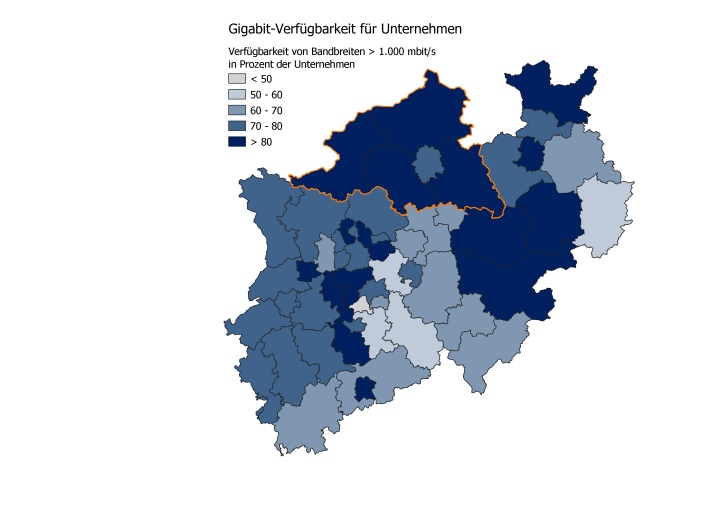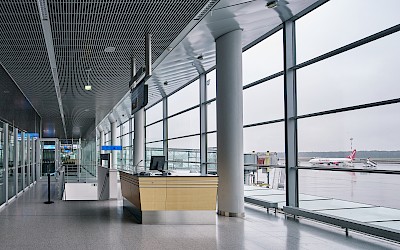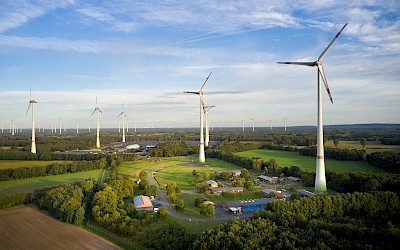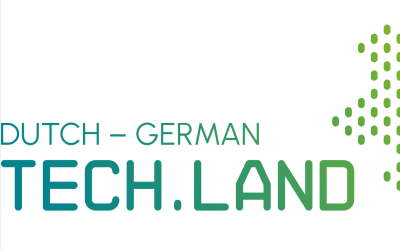GATEWAY TO MÜNSTERLAND
SMART INFRASTRUCTURE FOR DYNAMIC BUSINESS
Münsterland offers infrastructure that gives companies a clear competitive edge: excellent transport connections, cutting-edge digital networks, and attractive commercial real estate create the foundation for business success and sustainable growth.
Münsterland is excellently connected - to the region, to Germany and to international markets. A dense highway network, direct rail connections, waterways, proximity to international seaports and Münster/Osnabrück Airport (FMO) offer companies flexible and efficient transportation options. Cross-border connections to the Netherlands are also an integral part of the location's advantages.
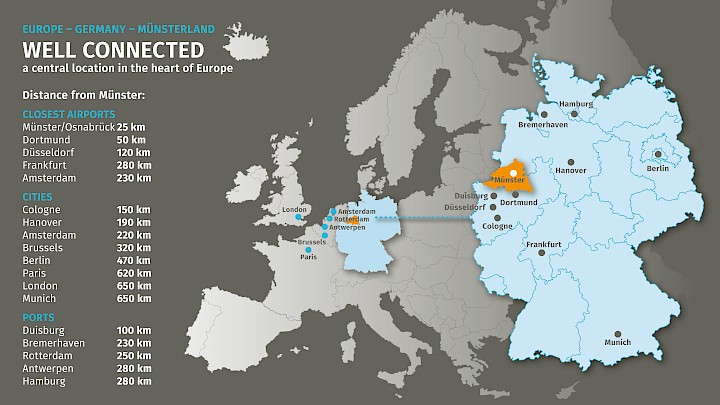
With five major highways, Münsterland is excellently integrated into the German and European highway network. They run in a north-south and east-west direction and enable fast and flexible accessibility for companies, commuters and logistics.
A1 - Hamburg - Bremen - Münster - Dortmund - Cologne
Runs through central Münsterland (e.g. Münster, Greven, Ascheberg, Werne).
→ Ideal for north-south connections within Germany.A2 - Oberhausen - Dortmund - Hanover
Runs through south-eastern Münsterland (e.g. Ahlen, Beckum, Warendorf).
→ Direct connection to the Ruhr region and Hanover.A3 - Cologne - Oberhausen - Arnhem (NL)
Provides access to the western Münsterland (e.g. Bocholt, Rhede, Isselburg).
→ Good connection to the Netherlands and the Rhine region.A31 - Oberhausen - Borken - Gronau - Emden
Central north-south axis in western Münsterland (e.g. Coesfeld, Ahaus, Steinfurt).
→ Fast routes to the North Sea and the Ruhr region.A43 - Wuppertal - Recklinghausen - Münster
Crosses the southern part of the region (e.g. Dülmen, Nottuln, Haltern am See).
→ Connects Münster directly with southern NRW.
Thanks to its central location in Europe, Münsterland has excellent connections to international airports. Business travelers and investors benefit from short distances to important national and international hubs.
- Münster/Osnabrück Airport (FMO) - 25 km
- Dortmund Airport (DTM) - 50 km
- Düsseldorf Airport (DUS) - 120 km
- Frankfurt Airport (FRA) - 280 km
- Amsterdam Schiphol Airport (AMS) - 230 km
Whether Brussels, Amsterdam or Paris - the Münsterland offers an excellent starting point for trips to central economic and decision-making hubs in Europe. Thanks to optimal connections, many major cities can be reached in just a few hours - by train, car or plane.
- Cologne - 150km - approx. 2 hours (train)
- Hanover - 190km - approx. 2 hours (train)
- Amsterdam - 220km - approx. 3 hours (train)
- Brussels - 320km - approx. 4 hours (train)
- Berlin - 470km - approx. 4 hours (train)
- Paris - 620km - approx. 5 hours (train)
- London - 650km - approx. 6 hours (train)
- Munich - 650km - approx. 6 hours (train)
Thanks to its central location in Europe, Münsterland has excellent connections to major European seaports. For companies, this means short transport routes, efficient logistics and reliable supply chains for global trade.
Port of Duisburg
Distance to Münster: 100km (approx. 1-1.5 hours by truck)
Special feature: Europe's largest inland port, central logistics hub with multimodal connections (rail, road, water)Port of Bremerhaven
Distance to Münster: 230 km (approx. 3-3.5 hours by truck)
Special feature: One of the most important container ports in Germany, focus on automobile and overseas transportPort of Rotterdam (NL)
Distance to Münster: 250 km (approx. 2.5-3 hours by truck)
Special feature: Largest seaport in Europe, international logistics center with direct rail connectionPort of Antwerp (BE)
Distance to Münster: 280 km (approx. 3.5-4 hours by truck)
Special feature: One of the largest universal ports in Europe, strong in chemicals, general cargo and container logisticsPort of Hamburg
Distance to Münster: 280 km (approx. 3.5-4 hours by truck)
Special feature: Globally important overseas port, comprehensive port logistics for various industries
The transport links are supplemented by two waterways, the Dortmund-Ems Canal and the Mittelland Canal, which offer direct connections to the Silk Road (Duisburg/Rhine) and the North Sea-Atlantic route (e.g. Rotterdam). The Hansa Business Park transhipment point on the Dortmund-Ems Canal, for example, is 250 meters long and enables two heavy-lift vessels to be loaded and unloaded simultaneously.
A DIGITAL HUB FOR GROWTH AND INNOVATION
A strong digital infrastructure is the foundation for modern business and high quality of life in Münsterland. The districts of Coesfeld and Steinfurt lead the state of North Rhine-Westphalia with nearly 90% fiber optic coverage—an ongoing success story. Companies benefit from fast, reliable internet for all digital business processes. At the same time, the region’s strong fiber optic network promotes a better balance between work, family, and personal life.
